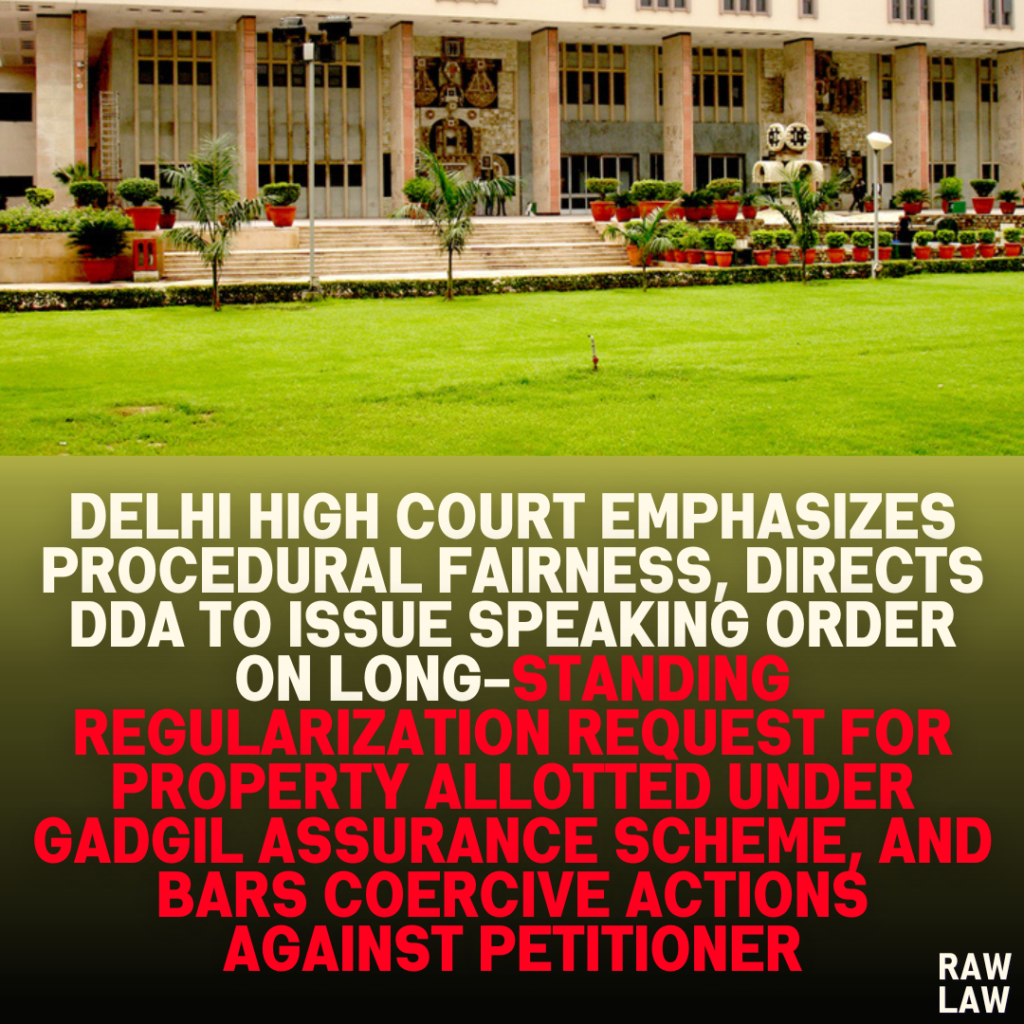Court’s Decision: The Delhi High Court directed the Delhi Development Authority (DDA) to treat the petitioner’s current plea as a representation. The court instructed DDA to issue a Speaking Order addressing the petitioner’s request for the regularization of his property. The DDA is expected to complete this process within 12 weeks and notify the petitioner via postal service and email. Until the Speaking Order is finalized and for two additional weeks, the court ordered that no coercive measures should be taken against the petitioner.
Facts: The petitioner has sought the regularization of property (No. T-1888, Ashoka Pahari Upper Ridge Road, Karol Bagh, New Delhi-110005) that was allocated to him in 1951 after a census of squatters. The property, eligible for regularization under the Gadgil Assurance Scheme, has been occupied by the petitioner, who claims to have paid damages for its use consistently. The petitioner’s demand for regularization, however, has reportedly been pending for a considerable period.
Issues:
- Whether the DDA is obligated to regularize the petitioner’s property as per the Gadgil Assurance Scheme.
- Whether the petitioner is entitled to a Speaking Order from the DDA regarding his long-standing request for property regularization.
Petitioner’s Arguments: The petitioner argued that his property was allocated after the census of squatters and that his eligibility for regularization was affirmed under the Gadgil Assurance Scheme. He claimed to have fulfilled his financial obligations towards the DDA by paying damages for his occupation. However, despite these payments and prolonged efforts, his demand for regularization remains unresolved.
Respondent’s Arguments: The DDA, represented by its counsel, indicated that it would examine the petitioner’s case and issue a Speaking Order. The DDA confirmed that it would allow the petitioner or his representative an opportunity for a hearing before the Director of the Old Scheme Branch (OSB) to present any necessary clarifications.
Analysis of the Law: The Gadgil Assurance Scheme provisions, relevant to property allocations and their potential for regularization, allow for allotments to squatters identified in historical censuses. The legal obligation for the DDA to issue a Speaking Order aligns with principles of transparency and procedural fairness in administrative decisions, especially when demands for regularization are made.
Precedent Analysis: No specific precedents were cited; however, the court’s reliance on principles of procedural fairness and administrative transparency reflects broader legal standards in property regularization cases.
Court’s Reasoning: The court recognized the petitioner’s long-standing occupation of the property and his compliance with the payment obligations as indicative of a legitimate interest in its regularization. It emphasized the need for procedural fairness, mandating that the DDA consider the petitioner’s case through a Speaking Order to clarify his eligibility and regularize the property if warranted.
Conclusion: The court ordered the DDA to treat the petitioner’s plea as a representation, instructing it to issue a Speaking Order within 12 weeks, allowing the petitioner to present clarifications. Additionally, it prohibited coercive actions against the petitioner until two weeks after the issuance of the Speaking Order.
Implications: This judgment reinforces the obligations of administrative bodies like the DDA to uphold procedural fairness when handling long-standing property regularization requests. It highlights the necessity for transparent decisions, particularly for properties allotted under schemes like the Gadgil Assurance, where historical occupancy and payment compliance are pivotal.




Pingback: Delhi High Court Quashes Bank’s Fraud Classification, Citing Violations of Natural Justice and Lack of Due Process: "Denial of Hearing Violates Principles of Fairness, No Grounds Existed for Declaring Petitioner as Fraud" - Raw Law